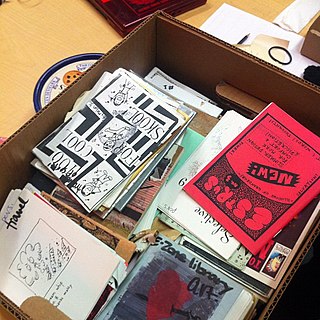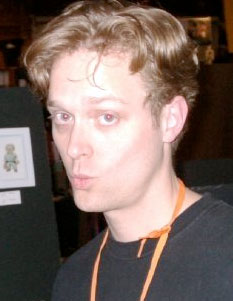
A zine is a small-circulation self-published work of original or appropriated texts and images, usually reproduced via a copy machine. Zines are the product of either a single person or of a very small group, and are popularly photocopied into physical prints for circulation. A fanzine is a non-professional and non-official publication produced by enthusiasts of a particular cultural phenomenon for the pleasure of others who share their interest. The term was coined in an October 1940 science fiction fanzine by Russ Chauvenet and popularized within science fiction fandom, entering the Oxford English Dictionary in 1949.

Glenn Herbert Gould was a Canadian classical pianist. He was among the most famous and celebrated pianists of the 20th century, renowned as an interpreter of the keyboard works of Johann Sebastian Bach. His playing was distinguished by remarkable technical proficiency and a capacity to articulate the contrapuntal texture of Bach's music.

Fantagraphics is an American publisher of alternative comics, classic comic strip anthologies, manga, magazines, graphic novels, and (formerly) the erotic Eros Comix imprint.
A minicomic is a creator-published comic book, often photocopied and stapled or with a handmade binding. In the United Kingdom and Europe the term small press comic is equivalent with minicomic, reserved for those publications measuring A6 or less.
Pagan Kennedy is an American columnist and author, and pioneer of the 1990s zine movement.

Mark Gerald Kingwell is a Canadian philosopher, professor and former associate chair at the University of Toronto's Department of Philosophy. Kingwell is a fellow of Trinity College. He specialises in theories of politics and culture. He writes widely in both scholarly and mainstream venues, and addresses specific topics in social justice, discourse ethics, aesthetics, film theory, philosophy of architecture and urbanism, philosophy of technology, and cultural theory.

Gregory Gallant, better known by his pen name Seth, is a Canadian cartoonist. He is best known for his series Palookaville and his mock-autobiographical graphic novel It's a Good Life, If You Don't Weaken (1996).

Bust is a women's lifestyle magazine that is published four times a year. The magazine was started by Debbie Stoller and Laurie Henzel and is currently published by Street Media LLC. Bust covers music, news, crafts, art, sex, and fashion from an independent ("indie"), third wave feminist perspective. The magazine's slogan is "For women with something to get off their chest."

Moto Hagio is a Japanese manga artist. Regarded for her contributions to shōjo manga, Hagio is considered the most significant artist in the demographic and among the most influential manga artists of all time, being referred to as the "god of shōjo manga" by critics.
Broken Pencil was a Canadian magazine based in Toronto, Canada that profiles zine culture and independent arts and music. It was founded in 1995 and published four times annually.

Carol Tyler is an American painter, educator, comedian, and eleven-time Eisner Award-nominated cartoonist known for her autobiographical comics. She has received multiple honors for her work including the Cartoonist Studio Prize, the Ohio Arts Council Excellence Award, and was declared a Master Cartoonist at the 2016 Cartoon Crossroads Columbus Festival at the Billy Ireland Cartoon Library & Museum.

Trina Robbins was an American cartoonist. She was an early participant in the underground comix movement, and one of the first women in the movement. She co-produced the 1970 underground comic It Ain't Me, Babe, which was the first comic book entirely created by women. She co-founded the Wimmen's Comix collective, wrote for Wonder Woman, and produced adaptations of Dope and The Silver Metal Lover. She was inducted into the Will Eisner Hall of Fame in 2013 and received Eisner Awards in 2017 and 2021.
Robert Kirby is an American cartoonist, known for his long-running syndicated comic Curbside – which ran in the gay and alternative presses from 1991 to 2008 – and other works focusing on queer characters and community, including Strange Looking Exile, Boy Trouble, THREE, and QU33R.

The Duplex Planet is a zine edited and published by David Greenberger since 1979. It contains transcriptions of his interviews with elderly residents of senior centers and "meal sites" in the Massachusetts area. For many years, the zine focused on the residents of the Duplex Nursing Home, located in Boston.

Jesse Reklaw is an American cartoonist and painter, author of the syndicated dream-based comic strip Slow Wave.

Nose goes or the nose game, also uncommonly called the "rule of nose goes", is a popular selection method most commonly used when deciding which of several persons is assigned an unwanted task.

Rob Walker is an American journalist, author and educator, whose primary interests include design, business, technology, consumer culture, and the arts.

Edward R. Piskor Jr. was an American alternative comics cartoonist. Piskor was known primarily for his work on Hip Hop Family Tree, X-Men: Grand Design, and the Red Room trilogy. Piskor also co-hosted the YouTube channel Cartoonist Kayfabe with fellow Pittsburgh native cartoonist Jim Rugg. In March 2024, Piskor was accused via social media of sexual misconduct. Piskor died on April 1, 2024, at the age of 41, hours after posting a suicide note via social media, defending himself against the allegations leveled against him.

Robert Wringham is a British writer, best known for his humor writing and as the editor of New Escapologist magazine. His first collection, A Loose Egg, was shortlisted for the 2015 Leacock Medal. He has also written two histories of alternative comedy and a comic novel.















